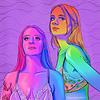Take a photo of a barcode or cover
challenging
emotional
informative
inspiring
reflective
medium-paced
Today, THE HOLLOW HALF (gifted by Catapult) finds its way, fully, into the world ♥️
After years of being hollowed out by illness, Aziza is hospitalized for anorexia. Meals are exactly portioned and forced down, violations are punished, communication with the outside world is limited. Illness is wiped clean of its history. Yet, history still finds her: for a moment within the hospital cafeteria, an apricot yogurt becomes a portal, a rupture, bringing along with it the realization that doctors here could not heal her. Generations of trauma and loss have made her a “fugitive from [her] own flesh,” a displacement that echoes the histories of Palestinian displacement that haunts her family. The seduction of starvation, inextricable from what has already been hollowed out inside. But just beyond displacement lies the “instinct to return.” And boldly, bravely, she does.
THE HOLLOW HALF is a return to the past, to dreaming of ghosts, to memories of when hunger was delicious, when the fullness of bodies was a cloak of safety. It is a tearing-apart of the seduction of white America, a shedding of disguise and the “beautiful life” of the American dream. It is a refutation to all the ways America promised to keep us safe. It is a return to the Palestine and Gaza that have always haunted her as shattered images on television, as vague entities that she watched fall from her father’s mouth as prayers, as photographs that always “left [her]…swimming in something [she] couldn’t name.” It is all of this, finally made physical: the texture of real, living land, alive and vibrant even as genocide seeks to destroy it—a testament to survival.
After years of being hollowed out by illness, Aziza is hospitalized for anorexia. Meals are exactly portioned and forced down, violations are punished, communication with the outside world is limited. Illness is wiped clean of its history. Yet, history still finds her: for a moment within the hospital cafeteria, an apricot yogurt becomes a portal, a rupture, bringing along with it the realization that doctors here could not heal her. Generations of trauma and loss have made her a “fugitive from [her] own flesh,” a displacement that echoes the histories of Palestinian displacement that haunts her family. The seduction of starvation, inextricable from what has already been hollowed out inside. But just beyond displacement lies the “instinct to return.” And boldly, bravely, she does.
THE HOLLOW HALF is a return to the past, to dreaming of ghosts, to memories of when hunger was delicious, when the fullness of bodies was a cloak of safety. It is a tearing-apart of the seduction of white America, a shedding of disguise and the “beautiful life” of the American dream. It is a refutation to all the ways America promised to keep us safe. It is a return to the Palestine and Gaza that have always haunted her as shattered images on television, as vague entities that she watched fall from her father’s mouth as prayers, as photographs that always “left [her]…swimming in something [she] couldn’t name.” It is all of this, finally made physical: the texture of real, living land, alive and vibrant even as genocide seeks to destroy it—a testament to survival.
challenging
emotional
inspiring
reflective
sad
medium-paced
challenging
emotional
inspiring
reflective
sad
tense
slow-paced
emotional
informative
reflective
sad
medium-paced
The Hollow Half is a beautiful, flowing masterpiece exploring mental health, the body, family, and culture. I adored how the author moved between her exploration of her individual struggles and the more generational trauma and collective trauma of membership in a marginalized group of people. In addition, resources were included from nonfiction sources on Palestinian history and current events. Her writing was poetic and stunning. I would like to revisit this on audio when it comes out as it's a book to be read more than once.
challenging
emotional
informative
reflective
medium-paced
challenging
emotional
informative
inspiring
reflective
sad
medium-paced
Pure poetry.
challenging
dark
emotional
inspiring
reflective
medium-paced
Thank you to NetGalley and the publisher for the eARC! This book will be published in the US on April 22, 2025 by Catapult.
“I am no longer bewildered by my collapse but by all we have survived.”
Sarah Aziza’s The Hollow Half is an unpeeling, a revealing, a rebirth. It is an excavation of hunger—not just for food, but for identity, for history, for wholeness. Aziza writes with an unflinching gaze, dissecting the line between living and dying, exploring how each can masquerade as the other. At its core, this memoir is about anorexia, but it is just as much about intergenerational trauma, exile, and the weight of assimilation.
Aziza’s illness peaks during the first year of her marriage, a time when she obsessively curates her image online while her husband monitors her pulse as she sleeps. At 5’10” and 82 pounds, she is given an ultimatum: treatment or death. Yet, within the sterile walls of the eating disorder ward, Aziza finds herself suffocated by the behavioral modification techniques that reduce recovery to numbers—calories, pounds, intake forms. She exposes the rigid surveillance and loss of autonomy inherent in mainstream eating disorder treatment, questioning the assumption that such illnesses belong only to rich, white women.
But the roots of her disorder run deeper. In the hollow spaces where hunger festers, Aziza unearths the buried history of her father’s Palestinian identity—an identity he tried to suppress in an effort to sell her the American dream. The ghost of her Sittoo, her grandmother, lingers throughout the book, whispering of Gaza, of refugee camps, of a homeland lost but never forgotten. Through her father’s retold stories, Aziza comes to understand her disorder as a form of self-erasure—of her race, her queerness, her very being. The weight of exile and assimilation presses against her ribs, manifests in her refusal to take up space.
The memoir is a study of language, too—of the words spoken and unspoken, of Arabic phrases that carry histories, of the silences that shape identity. Aziza investigates her childhood with a forensic tenderness, tracing her first moments of bodily discomfort to the judgmental gaze of white childhood friends who ridiculed her Sittoo’s eating habits. That shame, that quiet rejection of inheritance, becomes a fracture that deepens over time. In searching for Sittoo’s past, Aziza begins to reclaim herself.
Her prose moves like water, shifting between stark, clear-eyed realism and lush, melancholic lyricism. Time bends, memory unfurls, and the narrative pulses with both urgency and restraint. There is an ache in every sentence, a longing woven into every reflection. The result is hypnotic, a memoir that feels less like a telling and more like a haunting.
Ultimately, The Hollow Half is about survival—not just of the body, but of the self. It is about reclaiming a stolen birthright, about refusing disappearance. In the end, Aziza does not find healing within the confines of carceral psychiatry. She finds it in her father’s stories, in the land of her ancestors, in the act of remembering. This memoir is a testament to the power of recognition—to see oneself, in all one’s fullness, and to finally say: I exist.
📖 Recommended For: Readers drawn to lyrical, introspective memoirs that explore identity, diaspora, and survival; those interested in eating disorder narratives beyond the white, Western lens; fans of Hala Alyan, Emmeline Clein, and Carmen Maria Machado.
🔑 Key Themes: Intergenerational Trauma and Diaspora, Body and Self-Erasure, Cultural Inheritance and Belonging, The Power of Language and Storytelling.
Graphic: Eating disorder, Genocide, Forced institutionalization, War
Moderate: Pandemic/Epidemic
Minor: Child death, Drug use, Fatphobia, Rape, Sexual content, Suicidal thoughts, Police brutality, Medical content, Sexual harassment, Dysphoria
Note about "Forced Institutionalization" warning:
Sarah was admitted to in-patient eating disorder treatment voluntarily, under an ultimatum from her husband. The first part of the book describes her experiences on the eating disorder ward quite vividly. While she was admitted voluntarily, because of the nature of carceral psychiatry and because StoryGraph does not have an “In-Patient Treatment” content warning option, I’ve chosen to use the Forced Institutionalization content warning option.
TW: suicide, rape, eating disorder, anorexia, racism
The Hollow Half is a severance and a binding. I found within it a sense of something being let go of and something else being held on to, although there is so much pain in this book. It is about her eating disorder, feeling dislocated from where you come from but also completely acquainted with the place where the bones of your ancestors are buried. The Hollow Half is a kaleidoscope of pain but also one of beauty. It is raw and inflamed as any wound, it is a wound the way a wound is an expression of pain endured, but it is also a promise to heal and to resist. This book is so deeply tied to generations of thinking about Palestine, about colonialism, about settler colonialism and racism and statelessness, about eating disorders and forced starvation and how sometimes, we only know how much we love someone when they've left us in this life. Read this book but read it with care.
The Hollow Half is a severance and a binding. I found within it a sense of something being let go of and something else being held on to, although there is so much pain in this book. It is about her eating disorder, feeling dislocated from where you come from but also completely acquainted with the place where the bones of your ancestors are buried. The Hollow Half is a kaleidoscope of pain but also one of beauty. It is raw and inflamed as any wound, it is a wound the way a wound is an expression of pain endured, but it is also a promise to heal and to resist. This book is so deeply tied to generations of thinking about Palestine, about colonialism, about settler colonialism and racism and statelessness, about eating disorders and forced starvation and how sometimes, we only know how much we love someone when they've left us in this life. Read this book but read it with care.




